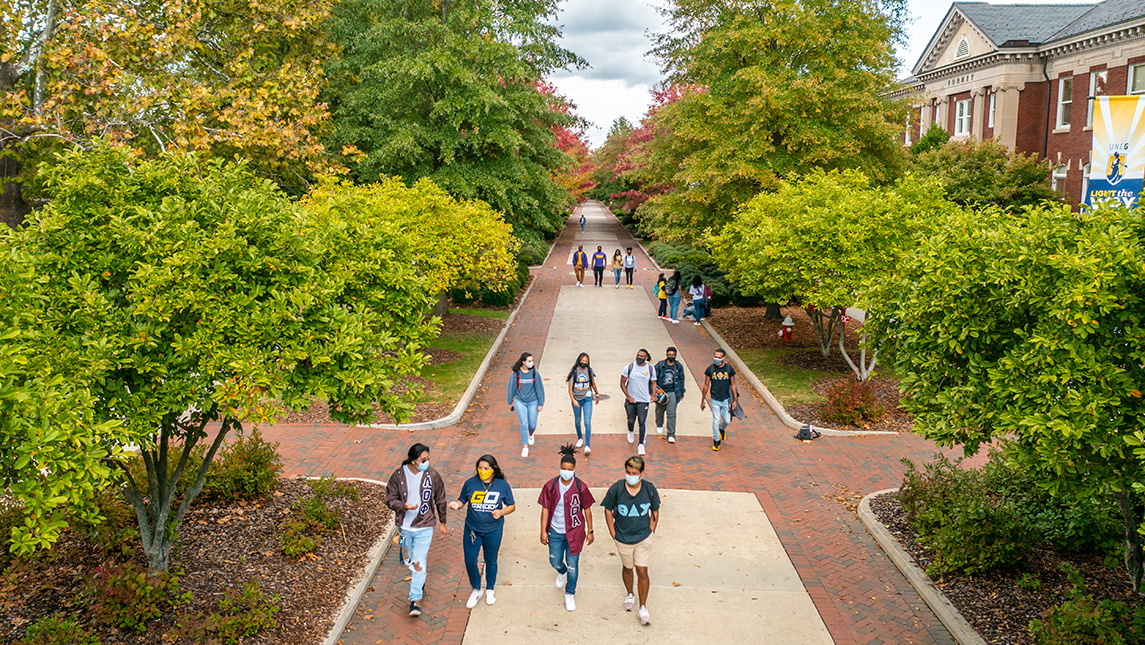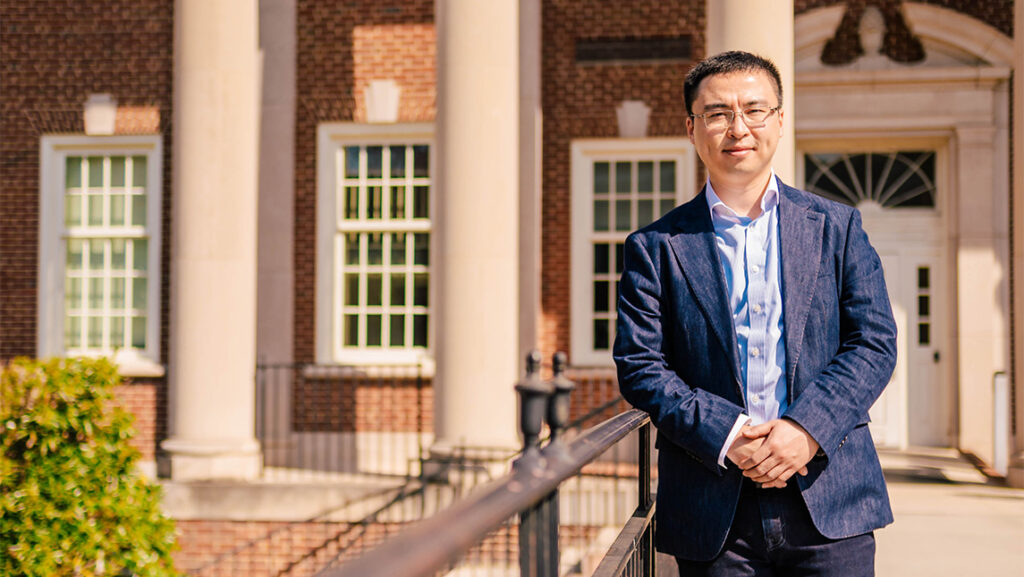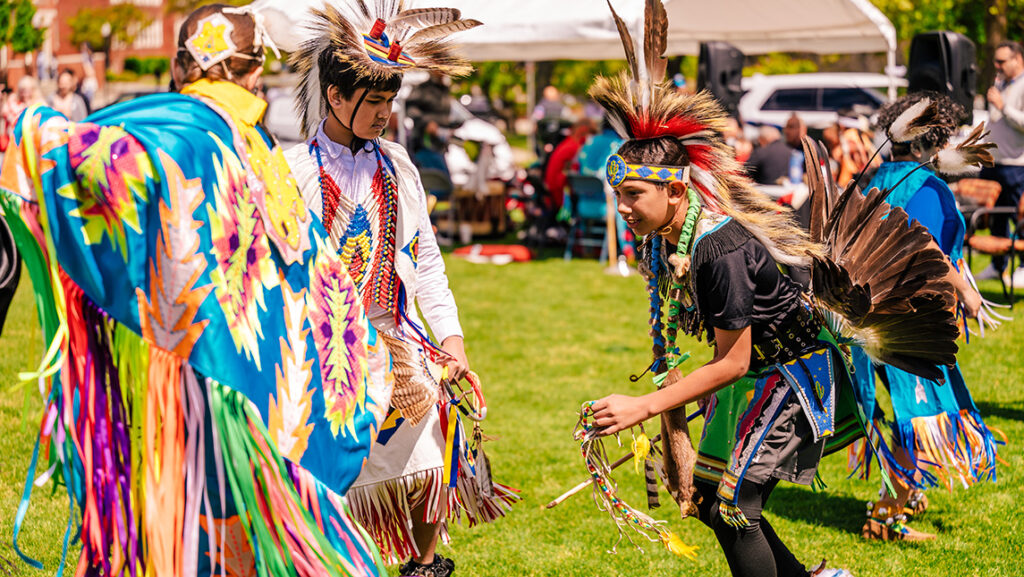
Transfer students are an integral part of UNC Greensboro’s campus community. Over 1,700 new transfer students are admitted to UNCG every fall, and transfer students make up nearly half of the University’s graduating class each year.
Although the transition between institutions can be complex, it is a valuable pathway to bachelor’s degree completion, and UNCG is there every step of the way to meet the diverse student needs and identities within transfer populations.
And that transition just became more seamless.
UNCG and Guilford Technical Community College (GTCC) have been selected to join the inaugural cohort of the Aspen Institute-AASCU (American Association of State Colleges and Universities) Intensive: Transfer Student Success and Equity. UNCG and GTCC are the only institutions in North Carolina selected for the prestigious program, comprised of 29 other two- and four-year partnerships from across the country.
Nearly two years into the pandemic, community colleges and four-year colleges and universities across the country face an imperative to ensure students from communities disproportionately impacted by the pandemic can access, persist through, and realize their higher education aspirations. The need is particularly acute in North Carolina, where enrollment in the state’s community colleges dropped dramatically.
“We are in a unique position to create a better future for our state with this critical initiative, to build something better,” said Chancellor Gilliam. “Together, with our longtime partner GTCC, we can develop a new, seamless model that serves the needs of all students, creates easier transfer pathways, and expedites time to degree to meet the needs of our growing economy.”
“At GTCC, we strive to break down barriers to educational opportunities for our students. Enhancing our transfer programs with UNCG is just one way we’re working to do this,” said GTCC President Anthony Clarke, Ph.D. “Making sure students are supported by both institutions along the way is critical to their success. We’re always looking for ways to make the transfer process as smooth as possible to ensure a successful educational journey.”
“Together, with our longtime partner GTCC, we can develop a new, seamless model that serves the needs of all students, creates easier transfer pathways, and expedites time to degree to meet the needs of our growing economy.”
– Chancellor Gilliam
The Intensive, funded with support of Ascendium Education Philanthropy, runs through October 2022. Teams will receive one-on-one consulting with experts and work to identify, collect, understand, and utilize critical transfer outcomes and equity data. As part of this community of practice, teams will attend monthly sessions focused on co-creating practices and policies to improve transfer student success and equity.
UNCG and GTCC will join 67 of their peers in this effort, selected from an applicant pool of 97 institutions and 3 systems from 25 states. Together, these cohorts account for a total enrollment of nearly one million undergraduate students, offering the promise of significant impact.
For UNCG, participation in the Transfer Student Success Intensive represents an important extension of efforts to increase community college transfer and bachelor’s degree attainment. These include the Transfer2Transfer Mentors program, funded by the Bill and Melinda Gates Foundation that connected 300 students in its first year; the Transfer Advisory Council, a sixteen-member group of faculty, staff, and administrators making UNCG a more transfer-friendly institution; and efforts to ensure ease of access, enhanced advising, course registration and transfer credit resources, and more hands-on programs geared toward student success.

One Spartan who can speak to the value of a seamless transfer process is social work major and transfer student Todd Perry.
Perry has spent much of his life while in long-term recovery using his experience to help others through substance abuse and mental health battles by drawing upon his own experiences.
It’s his calling in life – and that calling led him to go back to school to pursue a degree in social work.
After graduating from Alamance Community College in 2019, he knew he wanted to pursue a four-year degree; he just didn’t know where he would fit in.
But when he met with a transfer specialist on UNCG’s campus, everything changed.
“I was scared to open up about my past, but as soon as I did, she said, ‘You’ll be a great asset to our Spartan Recovery Program.’ I felt wanted here at UNCG.”
Perry describes his transfer experience as smooth, despite his apprehensions coming to a four-year institution not only as a transfer student, but also as a non-traditional student.
“I was immediately connected with the resources that I needed to succeed academically. The first class you take – FYE101 – is geared towards what UNCG can do for you.”
Perry also credits the people he has met on campus as making UNCG feel like home. In the Transfer2Transfer Mentors Program, he was paired with a mentor who was not only another non-traditional student, but also in long-term recovery. And since being on campus, he has been working closely with the Spartan Recovery Program.
Perry describes his time at UNCG and being able to use his voice and degree program to help others as the best years of his life.
“The lack of judgment and the endless amount of encouragement I’ve received by everyone on this campus has taught me I can smash the limitations that are in my head. If you have a whole community of people believing in you, you can do anything.”
– Todd Perry
For a full list of institutions selected for the first two cohorts of the Transfer Student Success Intensive and details about the initiative, please visit highered.aspeninstitute.org/transfer-intensive/.
For more information about transferring to UNCG, click here.
Story by Eden Bloss and Alexandra McQueen, University Communications
Photography by Grant Evan Gilliard, University Communications


